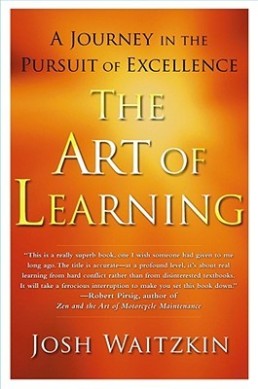“Growth comes at the point of resistance. We learn by pushing ourselves and finding what really lies at the outer reaches of our abilities.”
– Josh Waitzkin, The Art of Learning: A Journey in the Pursuit of Excellence
Josh Waitzkin knows what it means to be at the top of his game. A public figure since winning his first National Chess Championship at the age of nine, Waitzkin was catapulted into a media whirlwind as a teenager when his father’s book Searching for Bobby Fischer was made into a major motion picture. After dominating the scholastic chess world for ten years, Waitzkin expanded his horizons, taking on the martial art Tai Chi Chuan and ultimately earning the title of World Champion. How was he able to reach the pinnacle of two disciplines that on the surface seem so different? “I’ve come to realize that what I am best at is not Tai Chi, and it is not chess,” he says. “What I am best at is the art of learning.”
With a narrative that combines heart-stopping martial arts wars and tense chess face-offs with life lessons that speak to all of us, The Art of Learningtakes readers through Waitzkin’s unique journey to excellence. He explains in clear detail how a well-thought-out, principled approach to learning is what separates success from failure. Waitzkin believes that achievement, even at the championship level, is a function of a lifestyle that fuels a creative, resilient growth process. Rather than focusing on climactic wins, Waitzkin reveals the inner workings of his everyday method, from systematically triggering intuitive breakthroughs, to honing techniques into states of remarkable potency, to mastering the art of performance psychology.
Through his own example, Waitzkin explains how to embrace defeat and make mistakes work for you. Does your opponent make you angry? Waitzkin describes how to channel emotions into creative fuel. As he explains it, obstacles are not obstacles but challenges to overcome, to spur the growth process by turning weaknesses into strengths. He illustrates the exact routines that he has used in all of his competitions, whether mental or physical, so that you too can achieve your peak performance zone in any competitive or professional circumstance.
In stories ranging from his early years taking on chess hustlers as a seven year old in New York City’s Washington Square Park, to dealing with the pressures of having a film made about his life, to International Chess Championships in India, Hungary, and Brazil, to gripping battles against powerhouse fighters in Taiwan in the Push Hands World Championships, The Art of Learning encapsulates an extraordinary competitor’s life lessons in a page-turning narrative.
“The key to pursuing excellence is to embrace an organic, long-term learning process, and not to live in a shell of static, safe mediocrity. Usually, growth comes at the expense of previous comfort or safety.”
“If I want to be the best, I have to take risks others would avoid, always optimizing the learning potential of the moment and turning adversity to my advantage. That said, there are times when the body needs to heal, but those are ripe opportunities to deepen the mental, technical, internal side of my game. When aiming for the top, your path requires an engaged, searching mind. You have to make obstacles spur you to creative new angles in the learning process. Let setbacks deepen your resolve. You should always come off an injury or a loss better than when you went down.”
“One idea I taught was the importance of regaining presence and clarity of mind after making a serious error.”
“Everyone at a high level has a huge amount of chess understanding, and much of what separates the great from the very good is deep presence, relaxation of the conscious mind, which allows the unconscious to flow unhindered.”
“A key component of high-level learning is cultivating a resilient awareness that is the older, conscious embodiment of a child’s playful obliviousness.”
“One of the most critical strengths of a superior competitor in any discipline—whether we are speaking about sports, business negotiations, or even presidential debates—is the ability to dictate the tone of the battle.”
“The human mind defines things in relation to one another—without light the notion of darkness would be unintelligible”

